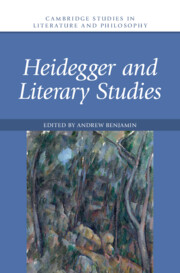Book contents
- Heidegger and Literary Studies
- Cambridge Studies in Literature and Philosophy
- Heidegger and Literary Studies
- Copyright page
- Contents
- Contributors
- Heidegger and Literature: An Introduction to the Question
- I Literature and Poetry
- 1 Heidegger’s Literary Secret
- 2 The Event’s Foreign Vernacular
- 3 Shared Habits: Love, Time, and The Magic Mountain in 1925
- 4 From Tool to Poem
- 5 Heidegger’s Use of Poetry
- II Heidegger and Greek Literature
- III Heidegger and Literary Works
- Heidegger, Index of Works
- General Index
- References
1 - Heidegger’s Literary Secret
from I - Literature and Poetry
Published online by Cambridge University Press: 09 November 2023
- Heidegger and Literary Studies
- Cambridge Studies in Literature and Philosophy
- Heidegger and Literary Studies
- Copyright page
- Contents
- Contributors
- Heidegger and Literature: An Introduction to the Question
- I Literature and Poetry
- 1 Heidegger’s Literary Secret
- 2 The Event’s Foreign Vernacular
- 3 Shared Habits: Love, Time, and The Magic Mountain in 1925
- 4 From Tool to Poem
- 5 Heidegger’s Use of Poetry
- II Heidegger and Greek Literature
- III Heidegger and Literary Works
- Heidegger, Index of Works
- General Index
- References
Summary
It remains surprising to never see Heidegger pose the question What is literature? In this sense, our interrogation will revolve around why Heidegger never applies the “fundamental question” to the very specific form of logos at work and in play in literature. And thus, why Heidegger never overtly enquires into the heading which literature could provide for and in the “History of Being.” Does something lie in literature – a secret – which impedes its grasp in the ontological horizon of the “History of Being”?
- Type
- Chapter
- Information
- Heidegger and Literary Studies , pp. 15 - 28Publisher: Cambridge University PressPrint publication year: 2023

